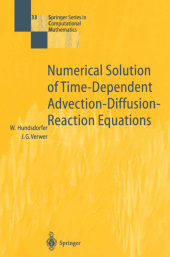 Neuerscheinungen 2010Stand: 2020-01-07 |
Schnellsuche
ISBN/Stichwort/Autor
|
Herderstraße 10
10625 Berlin
Tel.: 030 315 714 16
Fax 030 315 714 14
info@buchspektrum.de |

Willem Hundsdorfer, Jan G. Verwer
(Beteiligte)
Numerical Solution of Time-Dependent Advection-Diffusion-Reaction Equations
Softcover reprint of the original 1st ed. 2003. 2010. x, 472 S. 194 SW-Abb.,. 235 mm
Verlag/Jahr: SPRINGER, BERLIN 2010
ISBN: 3-642-05707-1 (3642057071)
Neue ISBN: 978-3-642-05707-6 (9783642057076)
Preis und Lieferzeit: Bitte klicken
Unique book on Reaction-Advection-Diffusion problems This book describes numerical methods for partial differential equations (PDEs) coupling advection, diffusion and reaction terms, encompassing methods for hyperbolic, parabolic and stiff and nonstiff ordinary differential equations (ODEs). The emphasis lies on time-dependent transport-chemistry problems, describing e.g. the evolution of concentrations in environmental and biological applications. Along with the common topics of stability and convergence, much attention is paid on how to prevent spurious, negative concentrations and oscillations, both in space and time. Many of the theoretical aspects are illustrated by numerical experiments on models from biology, chemistry and physics. A unified approach is followed by emphasizing the method of lines or semi-discretization. In this regard this book differs substantially from more specialized textbooks which deal exclusively with either PDEs or ODEs. This book treats integration methods suitable for both classes of problems and thus is of interest to PDE researchers unfamiliar with advanced numerical ODE methods, as well as to ODE researchers unaware of the vast amount of interesting results on numerical PDEs. The first chapter provides a self-contained introduction to the field and can be used for an undergraduate course on the numerical solution of PDEs. The remaining four chapters are more specialized and of interest to researchers, practitioners and graduate students from numerical mathematics, scientific computing, computational physics and other computational sciences.
I Basic Concepts and Discretizations.- II Time Integration Methods.- III Advection-Diffusion Discretizations.- IV Splitting Methods.- V Stabilized Explicit Runge-Kutta Methods.


